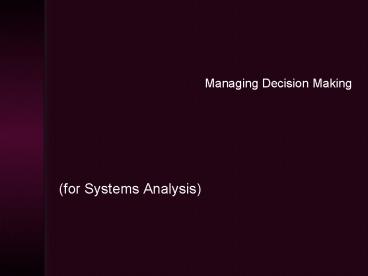Managing Decision Making PowerPoint PPT Presentation
1 / 11
Title: Managing Decision Making
1
Managing Decision Making
- (for Systems Analysis)
2
Decision-Making Processes
- The result of the analysis must be integrated
into the organization - Decision-making how to handle problems
integrating the system - Useful, too, at all stages of working with the
client and within groups.
3
Types of Decisions
- Programmed structured, occurs frequently
- Non-programmed unstructured, rare
- Ex. people follow a script for efficiency cant
break out - repercussions requires thought and
responsibility - Conditions
- States of certainty - know the alternatives
- Under risk - higher risk of mistake
- State of uncertainty - dont know the risks or
alternatives
4
Rational DM
- Classic model assumptions that people act on
logic and rational bases assumes - Decision makers have complete information about
the situation alternatives - DMs can eliminate uncertainty to achieve a
condition of certainty - DMs can evaluate all aspects logically
rationally - (Sounds good, but rarely is the case hence the
need for analysts!)
5
Steps in Rational DM
- Recognize define the situation
- Identify alternatives
- Evaluate alternatives feasibility,
satisfactoriness, consequences - Select best alternative
- Implement choice
- Follow-up and evaluate the results
6
Steps in Rational DM
- Recognize define the situation
- Recognize something (human/machine) isnt working
- Identify alternatives
- The more important the decision, the more
alternatives needed - e.g., raises for staff - Evaluate alternatives feasibility,
satisfactoriness, consequences - Consequence, e.g., management doesnt follow 2.1
- Select best alternative
- Situational factors and manager chooses for his
situation cant implement the change, so do
short-term benefit - Implement choice
- Incorporate change, but higher-up org must
approve - Follow-up and evaluate the results
- Measure benefit - usually quantified data
7
Model of classic DM evaluation of alternatives
8
Behavioral Aspects
- Administrative model
- Managers have (1) incomplete and imperfect info
- (2) are constrained by bounded rationality and
- (3) tend to satisfice accept alternative that
meets some minimum standard - Managers tend to be limited by their values and
unconscious reflexes, skills, and habits - Examples?
9
Political Forces
- People resist change some embrace it
uncertainty - Intuition
- This means more work! Something new means I have
to learn something new! - Escalation of Commitment
- Manager has made the decision when challenged
manager stays with it regardless of error - Respond by discussing risk propensity
10
Risk Propensity
- How much will the manager risk when making the
decision to integrate your work? Committed to
training, maintenance, etc. - Interaction groups get people to meet, convince
em - Delphi groups experts (admin managers)
discuss PR communicating their authorial
influence brings change - Nominal groups experts (admin managers) meet
to discuss their authority forces the change
11
Group and teams

